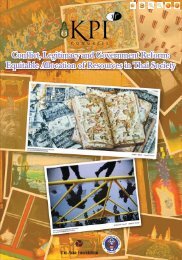SUFFiciENcy EcONOMy ANd GRASSROOtS DEvElOPMENt
SUFFiciENcy EcONOMy ANd GRASSROOtS DEvElOPMENt
SUFFiciENcy EcONOMy ANd GRASSROOtS DEvElOPMENt
Create successful ePaper yourself
Turn your PDF publications into a flip-book with our unique Google optimized e-Paper software.
The Meaning of Sufficiency Economy <br />
International Conference<br />
183<br />
declared that all things in the world arise continuously in this same way: conditioned<br />
by another and subject to the natural law of cause and effect. The gloss that<br />
Buddhists believe in the “interconnectedness of all life” stems from these more<br />
complex ideas. Thus no entity exists independently or permanently, not even the<br />
self. This belief stands in contrast with the Western assumption of an atomistic or<br />
isolated self, which forms the bedrock of mainstream neoclassical economic theory,<br />
which in turn informs our current global economy.<br />
An interdependent self has implications for self-interest. Since an individual’s<br />
actions are governed by the same law of causality that governs the rest of nature,<br />
they have consequences that arise in a non-linear fashion, possibly resulting in a<br />
karmic boomerang. Even without the Buddhist theory of being outlined above, we<br />
can easily observe such interdependence for ourselves. Take, for example,<br />
deforestation in Northern Thailand, which has come about due to a complex mix of<br />
both legal and illegal logging, encroachment by marginal farmers due to increased<br />
immigration and population growth, and the expansion of large-scale commercial<br />
agriculture (Hirsch 1996). Besides the primary economic and environmental effects<br />
of deforestation (such as loss of income from timber or NTFP and depletion of<br />
carbon sinks), there are further consequences: deforestation triggers erosion of fertile<br />
topsoil as well as drought, which in turn causes surface and groundwater to dry up.<br />
And since the majority of Thais who depend on an agricultural livelihood bear the<br />
brunt of these environmental costs, ecological deterioration causes the social divide<br />
to widen further. So clearly, it is in our “self” interests to take care of the<br />
environment and each other. As such, development decisions—whether they be for<br />
an individual, household, business, community, or nation—must factor in the<br />
possible effects on all spheres of human existence: individual, society and nature.<br />
This relationship is already suggested by the criterion of reasonableness as described<br />
above, but it could perhaps be more explicit.<br />
Just as an interdependent self results in an expanded self-interest, it similarly<br />
expands how we may conceive of self-reliance. In order to create sustainable<br />
livelihoods that foster wellbeing, we can and must rely on the people around us and<br />
our shared resources. This is of course already occurring across Thailand: family<br />
members contribute wages to their households, neighbors share labor at harvest<br />
time, women’s groups cooperate on income generating projects or organize savings<br />
clubs, villagers plant community wood lots on temple grounds, and so on. We can<br />
certainly see how individuals’, households’, and communities’ chances for survival,<br />
their self-immunity, and ultimately their well-being increase through such<br />
interdependent socio-economic relations. To better understand their complexities,<br />
and thus strengthen SE’s potential to contribute to community empowerment, we<br />
can turn to theoretical and practical discussions of community economies.














